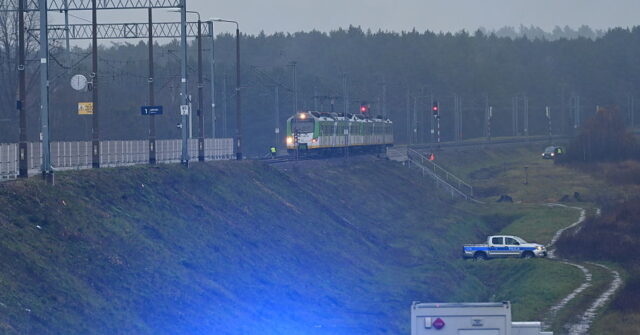An “act of sabotage” thought to be attempting to blow up a passing train on a “strategic railway” in side NATO territory and used by the alliance to resupply Ukraine with is being investigated by specialist prosecutors in Poland.
Tragedy may have been narrowly averted by a possibly “botched” bombing intended to destroy a passing train on a mixed passenger-freight line from Poland’s capital Warsaw to Lublin in the east over the weekend. The national prosecutor’s office said specialists from their organised crime and corruption division launched an investigation into the alleged sabotage on Monday and the government is to hold an extraordinary meeting of the National Security Council on Tuesday morning.
Poland’s Prime Minister Donald Tusk, a centre-left globalist and former European Union Commissioner said the nation’s “worst fears have been confirmed” after an explosion destroyed the railway on the Warsaw-Lublin route. He said the blast was “most likely intended to blow up a train”.
Tusk later added “Blowing up the rail track on the Warsaw-Lublin route is an unprecedented act of sabotage targeting directly the security of the Polish state and its civilians. This route is also crucially important for delivering aid to Ukraine. We will catch the perpetrators, whoever they are”. Sabotage carries up to life imprisonment, should a culprit be found and convicted.
The Deputy Interior Minister Maciej Duszczyk said Russian involvement can’t be ruled out but isn’t certain at this stage.
The chief of Poland’s national railway said “several incidents” were detected in close physical and time proximity on the Lublin line over the weekend, including the bombing of the railway line near the village of Mika in Garwolin County, a metal “clamp” attached to the track — potentially intending to cause a derailment — and damage to overhead lines. In all, two trains were damaged but no injuries occurred.
The Polish Army was inspecting the rest of the rail route leading from central Europe into Ukraine on Monday to guard against any other incidents.
Polish broadcaster Polsat cites national Secret Service official Tomasz Siemoniak, who said his officers were involved in the investigation because of “the probability that this was being done at the request of foreign services is very high”. It also reported the remarks of the former chief of the Polish Intelligence Agency Andrzej Derlatka who was hawkish on potential Russian involvement, and who said: “Poland is at war with Russia”.
He said Moscow was trying to “cause as much damage as possible” to Ukraine’s supporters through acts of sabotage. Indeed, Ukraine has jailed dozens of convicted saboteurs in the course of the war so far. Polsat had stated investigation insiders who said in this case, the attempted sabotage was potentially “botched” and the two explosive charges didn’t destroy a train as may have been intended.
Derlatka, for his part, leaned into this interpretation and remarked that it had been a case of “tragedy miraculously avoided”, and that had it succeeded it would have blocked a key strategic railway.
The Ukraine war, which if the allegations of Russian involvement are borne out would be clearly linked to the Poland railway blast, have been characterised by infrastructure sabotage from the very earliest days. Energy and logistical infrastructure have been particular targets and not just in Ukraine and Russia themselves, including mysteries such as the destruction of the Nordstream pipeline serving northern Europe with Russian gas exports, to recent blasts at the largest oil refinery in Hungary, processing imported Russian product.
Railways have been a key target, including in Poland. As reported in 2023, Poland convicted 14 “Russian spies” including alleged “Ukrainian refugees” over a plot to to sabotage the railway carrying military equipment from Europe into Ukraine.
Mutual railway sabotage between Ukraine and Russia has been frenetic. Russia unleashed heavy bombardments against Ukrainian railway facilities in the early days of the invasion and Ukraine has used teams of saboteurs and partisans deep behind enemy lines to blow up Russian rail lines supplying the front. As reported, given the state of Russian roads, Moscow’s invasion is heavily dependent on rail infrastructure to move up men and machines.
Russia responded by re-activating its fleet of armoured trains to protect its routes, although so far with only mixed results.


















